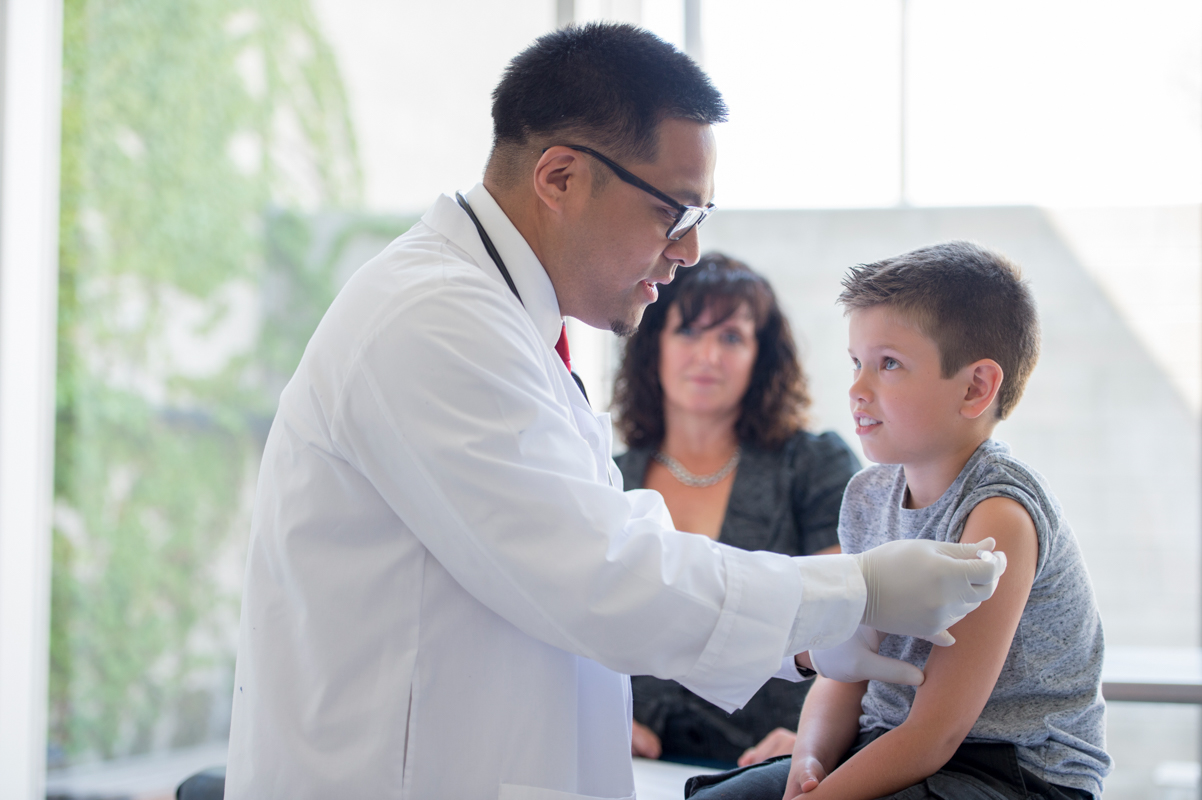What is Human Papillomavirus (HPV)?
HPV is a virus that can cause certain cancers and diseases in both males and females. It is easily spread from sexual skin-to-skin contact with someone who has it. HPV is the most common sexually transmitted infection in the United States, yet many people don’t even know they have it. HPV can cause six different types of cancers: mouth, throat, penile, vulvar, vaginal, and cervical—HPV is the #1 cause of most cervical cancers.

What is HPV Vaccine?
The HPV vaccine is a safe and effective way to prevent HPV-related cancers. It is recommended for all children starting at age nine. The HPV vaccine is given in a series of shots.
- For children ages nine to 14, the HPV vaccine is a series of two shots—the second shot is given six months after the first shot is administered
- For children 15 and older, the HPV vaccine is a series of three shots—the second shot is given two months after the first, and the third shot is given four months after the second shot
- The HPV vaccine can also be given to adults, before turning 45, if they did not receive it as a child
Talk to your health care provider or your child’s provider about getting the HPV vaccine.
Prevention and Early Detection


Bottom Line…The HPV Vaccine is Cancer Prevention
Test Your HPV Knowledge
The HPV vaccine is cancer prevention. It protects against HPV viruses that commonly cause which of the following cancers
- Cervical
- Anal
- Vaginal
- Throat
- Penile
- All the above
True or False: The HPV vaccine is recommended for teenage girls and boys at the age they begin sexual activity.
True or False: The HPV vaccine is given in a series of two or three shots, depending on the age of the child at the time of the first shot.
True or False: Adolescent and young adult lesbians are less likely to get the HPV vaccine.
True or False: The HPV vaccine doesn’t work for gay men and transgender women.
True or False: Four out of every 10 cases (40%) of HPV-related cancers are found in men.
True or False: The HPV vaccine was first recommended in 2006. Since then, HPV types that cause most HPV cancers have dropped by more than 80% among teen girls and young adult women.
Frequently Asked Questions
-
The HPV vaccine works best when given at a young age. Research shows that younger people have a better immune response to the HPV vaccine than those in their late teens and early 20s. This is also the age for other adolescent vaccinations and when children are likely to be still getting regular check-ups. The vaccine works best to prevent infection of nine types of HPV when it is received before exposure to the virus. So, it’s best to be vaccinated prior to sexual activity.
-
No. Because the HPV vaccine is made using only a single protein from each type of the virus, it can’t cause HPV infection, and, therefore, it can’t cause cervical cancer or other cancers.
-
The most common side effects of HPV vaccine are usually mild and include:
- Pain, redness, or swelling in the arm where the shot was given
- Fever
- Dizziness or fainting (fainting after any vaccine, including HPV vaccine, is more common among adolescents than others)
- Headache or feeling tired
- Nausea
- Muscle or joint pain
-
Yes. The HPV vaccine is recommended before the start of sexual activity for two reasons:
- Young people tend to get infected more frequently; in fact, about half of all new infections are diagnosed in girls and young women between 15 and 24 years of age
- It takes at least six months to complete the series, so even though your child may not be active now, or even in six months, it is better to have the series completed sooner rather than later
-
Yes. Even though it’s best if your child receives the vaccine before they are sexually active, they can still get it while being sexually active. If your child has come into contact with an HPV strain, the vaccine can protect them from other strains they haven’t encountered. Additionally, adolescents with a good immune system are likely to clear an HPV infection and will gain additional protection against reinfection.
-
Can 11- and 12-year-olds get the HPV vaccine at the same time as other vaccines?
Yes. The HPV vaccine can be given at the same time as other vaccines recommended at this age, including the vaccine for tetanus, diphtheria, and pertussis (Tdap) and the one for meningococcus. If it is flu season, a flu shot can be given as well.
-
Different states have different vaccine requirements for school enrollment. Currently, New York State does not require the HPV vaccine for school enrollment. Search other states
-
Yes. It is still important to get regular Pap tests to screen for cervical cancer. While the HPV vaccine protects against HPV strains most likely to cause cervical cancer, they can still contract a different strain or have been infected before receiving their vaccine.
